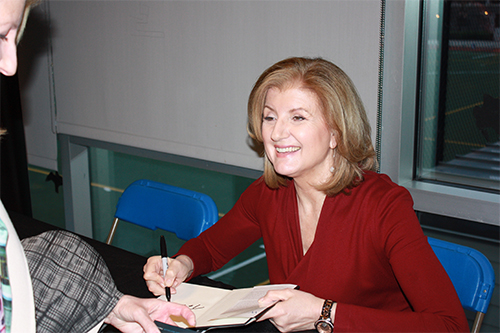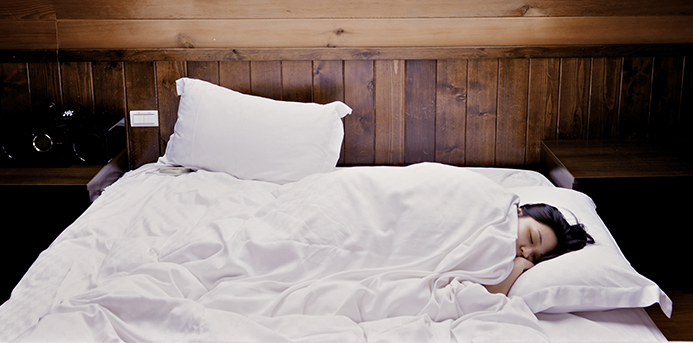“We are now part of a sleep deprivation epidemic,” says Arianna Huffington, co-founder and editor-in-chief of The Huffington Post and author of “The Sleep Revolution,” her 15th book, during her program at the Chicago Humanities Festival, the first of the new Spring Festival, Style. “Our addiction to technology makes it harder to disconnect with our devices and reconnect with ourselves,” says Huffington. She likens it to the first industrial revolution. “Human beings are treating themselves like machines, with the main goal of minimizing downtime,” says Huffington. Sleep is seen as an evolutionary fault, a waste of time, when, in fact, quality sleep is as necessary to our health and well-being as diet and exercise.

Sleep for Your Health
Sleep is the time for the brain to clean out toxins, repair tissues, consolidate memories and process emotions. “Insufficient sleep is linked to Alzheimer’s disease, hypertension, heart disease, diabetes, multiple sclerosis and mood disorders,” says Dr. Robert S. Rosenberg, medical director of the Sleep Disorders Center of Prescott Valley, Arizona, and author of “The Doctor’s Guide to Sleep Solutions for Stress and Anxiety.”
Sleep to Be Slim
“Weight loss is all about hormone function,” says Shawn Stevenson, creator of The Model Health Show, a popular nutrition and fitness podcast on iTunes, and author of “Sleep Smarter.” “Sleep quality is more influential to hormone health than diet or exercise.” He cites a University of Chicago study of participants on restricted-calorie diets. “Participants who slept 8.5 hours a night lost 55 percent more body fat than those who slept 5.5 hours,” says Stevenson. Metabolism slows down when you’re not getting enough rest, making it hard to get rid of stubborn belly fat. “The biggest influence of sleep deprivation is that you’re hungry the next day,” says Stevenson. “You’ll go for snacks you wouldn’t normally eat, and justify it because you’re tired.” When you’re struggling with biology versus willpower, Stevenson says, biology is going to win.
Sleep to Look and Feel Refreshed
There is such a thing as beauty sleep. “The biggest secretion of the human growth hormone, known as the youth hormone, happens during deep sleep,” says Stevenson. Looking for that radiant, youthful glow? Get some rest and you’ll look naturally recharged, and maybe even enhance your love life, too.
Sleep to Improve Your Relationship
“Well-rested women are 14 percent more likely to be engaged in healthy sexual activity the next day,” says Stevenson. “They’ll also experience increased sexual arousal during that intercourse.” Other relationship interactions improve too. A UC Berkeley brain imaging study found that those who are sleep-deprived can be hypersensitive and over-aggressive. “You’ll want to bite your partner’s head off for something small because the survival part of your brain is hijacking the system,” says Stevenson. Get some rest and petty arguments should diminish.
Sleep for the Whole Family
Most members of the modern family aren’t getting enough rest, and the reason is often tied to technology. “Parents of teens report that their kids get seven hours of sleep a night, when they should be getting at least 8.5,” says Kristen Knutson, Ph.D., assistant professor of medicine at the University of Chicago. While younger children should, and are reported to, sleep longer, each age group is about an hour deficient on shut-eye per night.
The presence of electronics, especially in the children’s bedrooms, had a significant negative impact on sleep. However, rules that ensured tech was turned off at a certain hour helped. “Sleep is like diet,” says Knutson, “It’s really hard for one family member to change and be successful. All have to come together for an age-appropriate conversation about the importance of sleep.” Huffington says you can rely on what her mom used to tell her — you will feel more alert, perform better (in school, sports and work) and be less cranky.
Wake Up to a Good Life
Huffington says certain cultures, like in big cities or cutthroat corporations, can glamorize sleep deprivation. People wear it like a badge of honor, bragging that they only got four hours of sleep the night before. “That’s the cognitive equivalent of going to work drunk,” Huffington says. She too was guilty of running on too little sleep, but didn’t just wake up one morning and see the error in her ways. She collapsed from sleep deprivation, hit her head on a desk and broke her cheekbone. “If that hadn’t happened, I probably would have had a heart attack, like so many executives collapsing on treadmills these days,” she says. Huffington commends Aetna Chairman and CEO Mark Bertolini for rewarding his workforce when they sleep seven or more hours per night. Productivity goes up when you’re mindful of well-being.
Recharge Yourself
Huffington wants to rekindle the romance with sleep, so that we actually look forward to it. Sleep, for her, used to be a heavily mined border that she avoided crossing at all costs. She’d constantly push herself to finish a project or answer 20 more emails. “We endlessly prolong work,” she says. “It never stops because our smartphones follow us everywhere.” She says the most important step to a sleep revolution is to turn devices off and gently escort them out of the bedroom at least 30 minutes before sleep. “We take better care of our smartphones than ourselves,” says Huffington. “We know how much battery is left in our smartphones, but what about ourselves? On the day that I collapsed, if you would have asked me how I felt, I would have said fine.” It’s not enough to just get things done. When you get more rest, you reawaken some of the joys in life.
Sleep Solutions
Don’t Count on Catch-Up
“Those who get 6.5 to 7.5 hours of sleep per night have the healthiest, longest lifespans,” says Rosenberg. But catch-up sleep doesn’t work. “Even if you sleep 10 to 12 hours per night on the weekend, but four to five every weeknight, the damage is already done to the brain and central nervous system,” says Rosenberg. Instead, he recommends a steady sleep/wake schedule that you can stick to on both weekdays and weekends. Sure, you might want to stay up a bit later on the weekends, but be wary of “social jet lag”— meaning if you sleep until noon on Sunday, it’s going to be difficult to get to sleep that night for work on Monday morning.
Have a Bright Day
“Expose yourself to sunlight as soon as possible after awakening,” says Rosenberg. Open the blinds and enjoy your morning coffee in front of a window. “People who work in well-lit areas are more alert, have less mood disorders and sleep better at night than people who work in dark cubby holes,” says Rosenberg. If you work in a cube without a window, take walks when possible. We know those who exercise sleep better, deeper and longer, and that morning exercise sets you up for a great day. New research does indicate though that exercising at night is better than not exercising at all. Omega 3s in fish and fish oil supplements can also help you sleep better and feel less stressed.
Find Out If There’s More to the Snore
According to Rosenberg, 54 percent of men snore and 22 percent of middle-aged men have sleep apnea, a condition that can lead to heart attack or stroke. If your partner is a habitual snorer, check with his or her doctor to see if sleep apnea is the cause. And if you get a bedroom divorce to improve your sleep, it doesn’t mean you can’t have conjugal visits.
OTCs Can Negatively Impact Memory
“Avoid medications, if possible,” says Rosenberg. “Especially over-the-counter ones, like Unisom or Tylenol PM. A big study just came out linking anticholinergic drugs to an increased risk of dementia.” Rosenberg recommends going to sleep the natural way, with your own sleep routine. “If you’re a worrier, do constructive worrying,” he says. “At 6 p.m., write down your problems and possible solutions, then put them in a desk drawer. Don’t bring them into the bedroom.”
Expert Tips for an Optimum Sleep Environment
Rosenberg’s recommendations:
- Keep it cool: 65-68 degrees.
- Make it dark: Eye masks and dark curtains help.
- Limit distractions: Use fans or Bose noise-cancelling headphones.
- Try hypnosis or meditation: Apps are available.
- Apply or diffuse lavender oil: Proven to help you fall asleep faster and stay asleep longer.
Huffington’s ritual:
- Hot bath with Epsom salts: “Water washes away the day.”
- Beautiful lingerie: Sleep clothes cue sleep.
- Physical, non-work-related books: No tech in the bedroom.
Knutson’s tips:
- Find what is most comfortable to you: Cotton pjs and silk sheets?
- Limit caffeine: Try herbal tea.
- Don’t drink alcohol: It will wake you in the middle of the night.
Stevenson’s hack:
- If you can’t stop working an hour before bed: Use a blue light blocker (Lux is an helpful app; Night Shift is an iOS 9 update).
MIB team favorite:
More from Make It Better:

